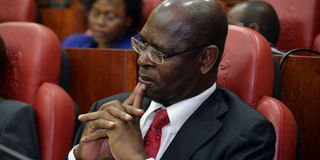Purging conflict of interest key to Kinisu’s survival at EACC

Ethics and Anti-Corruption Commission chairman Philip Kinisu when he appeared before the Joint Select Committee on electoral reforms at Parliament in Nairobi on July 25, 2016. PHOTO | SALATON NJAU | NATION MEDIA GROUP
What you need to know:
- A conflict of interest arises where a person is in a position to derive a personal benefit from actions or decisions made in their official capacity.
- The Public Officers’ Ethics Act forbids any public officer from holding any shares or any other interest in a corporation, partnership or body, directly or through another person, if such shares or interest would result in his or her personal interests conflicting with official duties.
The allegations against Mr Philip Kinisu, Chairman of the Ethics and Anti-Corruption Commission brings to the fore the issue of conflict of interest - which is at the core of Kenya’s struggle for a society that upholds ethics and integrity.
While the law recognises this challenge, the reality is that our politics and pursuit of leadership is generally motivated by the desire to access and control public resources for personal or group gain. There exists tension between the letter of the law and the values in action. The allegations against Mr Kinisu are now being investigated by an inter-agency team.
A conflict of interest arises where a person is in a position to derive a personal benefit from actions or decisions made in their official capacity.
Bunge la Mwananchi, the civil society group that raised the complaint against Mr Kinisu alleged that a company, Esaki Ltd, owned and managed by the chairman’s family was involved in dealings at the National Youth Service (NYS) involving payments for goods not supplied or over-priced.
The Public Officers’ Ethics Act deals with conflict of interest. It forbids any public officer from holding any shares or any other interest in a corporation, partnership or body, directly or through another person, if such shares or interest would result in his or her personal interests conflicting with official duties.
Where a public officer’s personal interest conflicts with his official duties, he is required to first declare the personal interests to his superior or other appropriate body and comply with any directions to avoid the conflict and secondly, refrain from participating in any deliberations with respect to the matter.
In Mr Kinisu’s case, he has confirmed publicly that Esaki Ltd is a family business in which he was a founding director and has since taking up the chairmanship of the EACC, resigned from its directorship.
As investigations continue, the critical questions which will ultimately determine culpability or lack of it will be whether in joining the EACC, the chairman declared to his fellow commissioners his association with Esaki Ltd and its business dealings with NYS, the latter having been already the subject of investigations by the EACC.
CONFLICT OF INTEREST
Further, if or not such declaration was made, whether he refrained from participating or influencing in any way deliberations or decisions regarding the investigations on NYS. If any of these two requirements were complied with, then on the face of it, any potential conflict of interest could have been purged.
On the matter of resignation from directorship of Esaki Ltd, the time when that happened would be material. Resignation and non-participation in decision making are not enough to ward off conflict of interest. The law broadens personal interest to include a spouse or relative.
In other words, even if Mr. Kinisu was never a shareholder or director of Esaki Ltd, he would have a personal interest in the company by virtue of the directorship, management and shareholding of his wife and his daughter. Besides, a critical question would be whether he was or is a beneficial owner of Esaki Ltd.
The concept of beneficial ownership goes beyond the letter of the documents of incorporation and management to look at the person for whom a corporation exists. The world is replete with corporations owned by proxies or nominee companies which on the face of it do not disclose the real owners of the business.
The question then on whether Mr Kinisu should resign his position at EACC turns on whether, having found himself in a possible conflict of interest he acted within the law to declare this interest to EACC, and whether after doing so he refrained from presiding over or participating in any deliberations on NYS matters.
If he didn’t, then he put himself in a conflict of interest situation that not only violates the law but is inconsistent with his continued role as a member and chairman of the EACC.
Mr Kimeu is the executive director, Transparency International– Kenya; [email protected]




